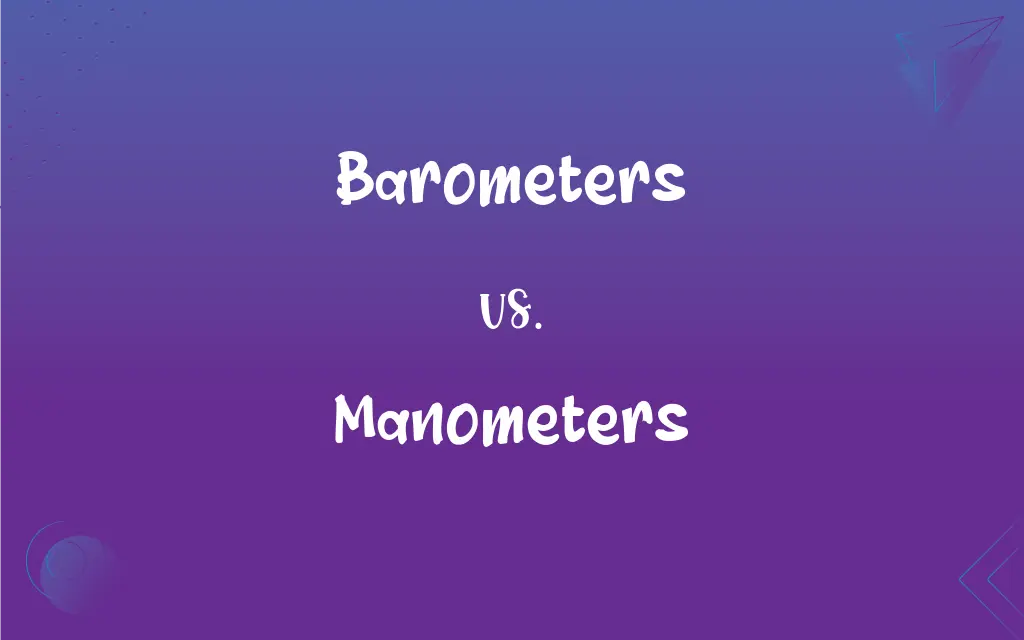Barometers vs. Manometers: What's the Difference?
Edited by Aimie Carlson || By Harlon Moss || Published on February 17, 2024
Barometers measure atmospheric pressure to forecast weather and altitude, while manometers measure pressure differences, often for gases or liquids in closed systems.

Key Differences
Barometers are instruments primarily used for meteorological purposes, measuring atmospheric pressure to predict weather changes. Manometers, conversely, are used to measure the pressure of gases or liquids in various applications, including industrial and scientific settings.
The design of barometers varies, including mercury and aneroid types, all focused on responding to atmospheric pressure changes. Manometers, which can be simple U-tube or more complex digital devices, measure pressure differences by balancing the weight of a fluid column against the pressure to be measured.
Barometers are essential tools in weather forecasting, helping predict weather patterns by detecting changes in atmospheric pressure. Manometers are commonly used in laboratories and industrial processes to monitor and control the pressure of gases and liquids.
The use of barometers in determining altitude is based on the principle that atmospheric pressure decreases with increasing altitude. Manometers, however, are often employed in settings like HVAC systems, gas pipelines, and medical equipment to ensure optimal pressure conditions.
Barometers provide valuable information for outdoor conditions and navigation, while manometers are crucial for safety and operational efficiency in various controlled environments, such as manufacturing plants and laboratories.
ADVERTISEMENT
Comparison Chart
Primary Use
Measuring atmospheric pressure
Measuring pressure differences in fluids
Application
Weather forecasting, altitude measurement
Industrial processes, scientific research
Measurement Focus
Atmospheric pressure changes
Pressure in closed systems
Types
Mercury, aneroid
U-tube, digital
Usage Environment
Meteorological, navigation
Laboratories, HVAC systems, medical equipment
ADVERTISEMENT
Barometers and Manometers Definitions
Barometers
Used in meteorology to predict changes in weather patterns.
Meteorologists rely on barometers for accurate weather predictions.
Manometers
Often used in laboratories to measure pressure differences accurately.
Researchers calibrated the manometer before conducting the experiment.
Barometers
It can indicate altitude based on changes in atmospheric pressure.
Hikers use barometers to determine their elevation while trekking.
Manometers
A device for measuring the pressure of gases or liquids in a system.
The technician used a manometer to check the gas pressure in the pipes.
Barometers
A device for measuring atmospheric pressure to forecast weather.
The barometer showed a drop in pressure, indicating a storm approaching.
Manometers
Essential for ensuring safe pressure levels in industrial applications.
Manometers are crucial for monitoring pressure in chemical reactors.
Barometers
An instrument that can be either mercury-based or aneroid.
The old ship had a classic mercury barometer mounted on its wall.
Manometers
Used in medical equipment to regulate and measure internal pressures.
In the hospital, manometers help ensure ventilators operate at correct pressures.
Barometers
Essential in navigation for measuring pressure at sea.
The captain checked the barometer regularly to navigate safely.
Manometers
Can be a simple U-tube filled with liquid or a sophisticated digital tool.
The HVAC system's efficiency was assessed using a digital manometer.
Barometers
An instrument for measuring atmospheric pressure, used especially in weather forecasting.
Manometers
An instrument used for measuring the pressure of liquids and gases.
Barometers
Something that registers or responds to fluctuations; an indicator
Opinion polls serve as a barometer of the public mood.
Manometers
A sphygmomanometer.
Barometers
Plural of barometer
Manometers
Plural of manometer
FAQs
What industries use manometers?
Manometers are used in HVAC, medical, and various industrial sectors.
What does a barometer measure?
A barometer measures atmospheric pressure.
What is the primary use of a manometer?
Manometers are used to measure pressure differences in fluids.
Can a barometer measure altitude?
Yes, based on the principle that atmospheric pressure decreases with altitude.
Can manometers measure gas pressure?
Yes, they are commonly used for gas pressure measurements.
How accurate are barometers?
Modern barometers are quite accurate for atmospheric pressure readings.
What role does a barometer play in meteorology?
It's crucial for forecasting weather patterns.
Are there different types of barometers?
Yes, including mercury and aneroid barometers.
What is a U-tube manometer?
It's a simple manometer with a U-shaped tube filled with liquid.
Is a barometer used in navigation?
Yes, especially in maritime navigation.
Can barometers predict weather?
Yes, changes in atmospheric pressure can indicate weather changes.
Can manometers detect leaks in systems?
Yes, by measuring pressure differences.
What liquids are used in U-tube manometers?
Often mercury or colored water.
How is a manometer used in medical equipment?
It measures and regulates pressure in devices like ventilators.
How do manometers work?
They measure pressure by balancing a fluid column against the pressure.
Do barometers need maintenance?
Regular calibration ensures their accuracy.
What factors affect barometer readings?
Atmospheric conditions like temperature and altitude.
Do manometers help in HVAC systems?
Yes, for maintaining optimal pressure levels.
Are digital manometers available?
Yes, digital manometers provide precise measurements.
Why are barometers important in aviation?
They help in determining altitude and forecasting weather.
About Author
Written by
Harlon MossHarlon is a seasoned quality moderator and accomplished content writer for Difference Wiki. An alumnus of the prestigious University of California, he earned his degree in Computer Science. Leveraging his academic background, Harlon brings a meticulous and informed perspective to his work, ensuring content accuracy and excellence.
Edited by
Aimie CarlsonAimie Carlson, holding a master's degree in English literature, is a fervent English language enthusiast. She lends her writing talents to Difference Wiki, a prominent website that specializes in comparisons, offering readers insightful analyses that both captivate and inform.
































































